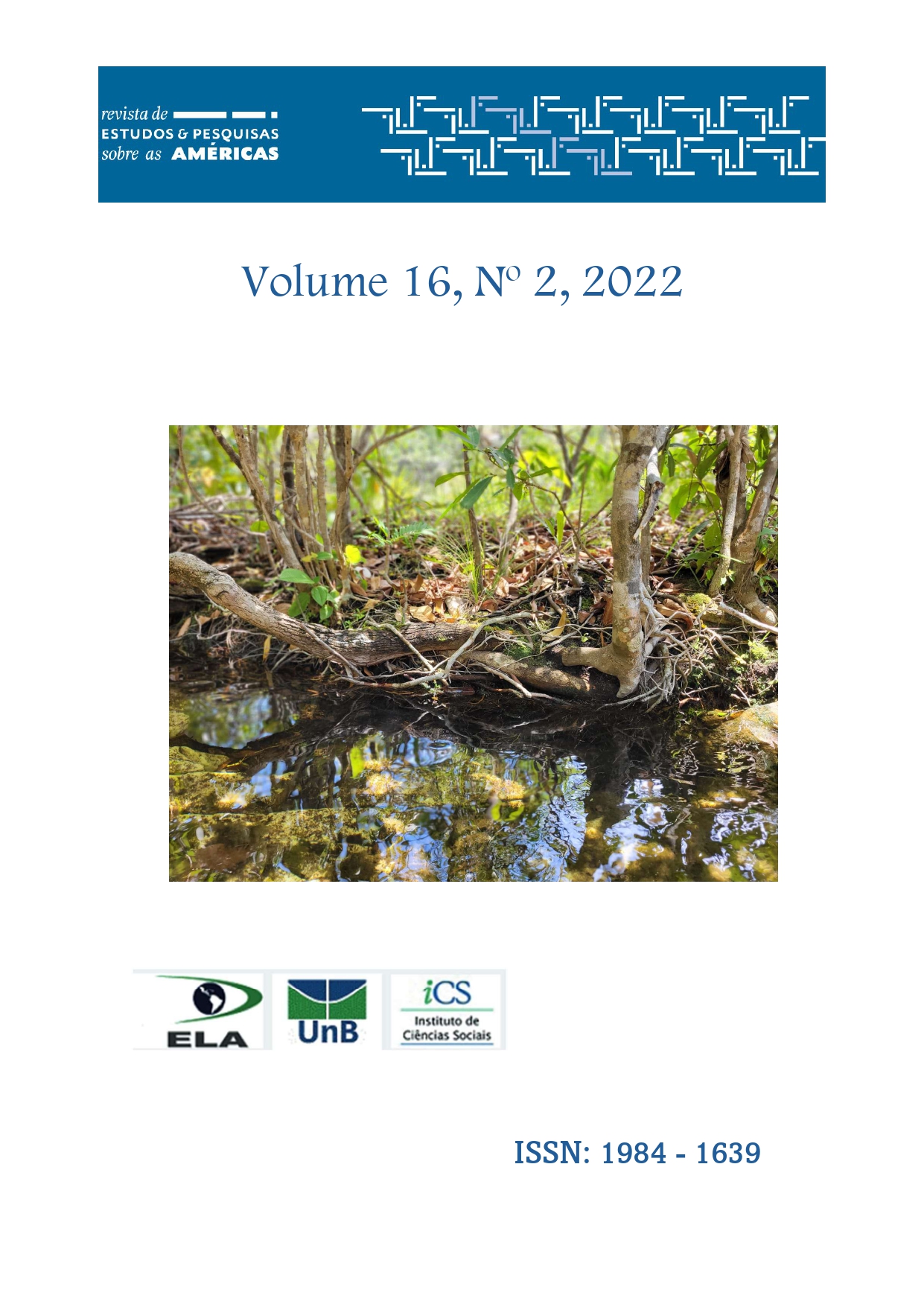Beyond Prometheus: human/nature relations and the AgriCulture of Enchantment
DOI:
https://doi.org/10.21057/10.21057/repamv16n2.2022.49316Keywords:
Xucuru do Ororubá, territorial management, anthropocene, indigenous peoplesAbstract
The objective of this article is to discuss other models of territory management and the human/nature relationship based on the experience of the cosmo-management of the Xukuru of Ororubá, focusing on the knowledge and experiences called AgriCulture of Enchantment. Far from the predatory paradigm of contemporary neoextractivism, this agriculture reflects ways of life that, as a whole, promote living on the land without compromising the biological and spiritual life of the Motherland, understood as a living macro-organism, home of the Ororubá enchanted kingdoms. In methodological terms, we resort to literature review and autobiographical narrative to discuss the basilar dichotomy between human and nature of modern Western thought, which leads us to the need for dialogue with other epistemic matrices that are founded on principles such as regeneration and reconnection.
References
ALMEIDA, Alfredo W. B. et al. Nova Cartografia Social dos Povos e Comunidades Tradicionais do Brasil: Xukuru do Ororubá-PE. Manaus: UEA Edições, 2012.
CASTILLO Oropeza, ADÁN, Oscar y ROCA-SERVAT, Denisse. “Introdución”. In: Oropeza Castillo, Oscar Adán y Denisse Roca-Servat (orgs.), Ecología política, sufrimiento socioambiental y acción política. Algunos debates contemporáneos en América Latina. Buenos Aires, CLACSO, 2024.
CORAZZA, Rosana I.; FRACALANZA, Paulo S.; BONACELLI, Maria Beatriz M. “Visões da escassez: uma interpretação do debate entre cientistas naturais e economistas no renascimento do ambientalismo”. Revista CTS, v. 29, n. 10, pp. 91-127, 2015.
CRUTZEN, Paul; STOERMER, Eugene. ‘The “Anthropocene”’. Global Change Newsletter, n. 41, pp. 17-18, 2000.
DESCARTES, René. Discurso do método. Tradução Maria Ermantina Galvão. São Paulo: Martins Fontes, 1996.
DESCOLA, Philippe. “Más allá de la naturaleza y de la cultura”. In: Leonardo Montenegro Martínez (org.), Cultura y naturaleza. Bogotá: Jardín Botánico de Bogotá José Celestino Mutis, 2011, pp. 75-96.
ECHEVERRÍA, Bolívar. “El ethos barroco”. In: Bolívar Echeverría (org.). Modernidad, mestizaje cultural, ethos barroco. México: ENAM/El Equilibrista, 1994, pp. 13-36.
ESCOBAR, Arturo. “El lugar de la naturaleza y la naturaleza del lugar: ¿globalización o postdesarrollo?”. In: Edgardo Lander (org.). La colonialidad del saber: eurocentrismo y ciencias sociales. Perspectivas latinoamericanas. Buenos Aires: CLACSO, 2000, pp. 68-87.
ESCOBAR, Arturo. “Más allá del desarrollo: postdesarrollo y transiciones hacia el pluriverso”. In: Revista de Antropología Social, 21, pp. 23-62, 2012.
ESCOBAR, Arturo. Sentipensar con la tierra. Nuevas lecturas sobre desarrollo, territorio y diferencia. Medellín: Ediciones UNAULA, 2014.
HARAWAY, Donna. “Anthropocene, Capitalocene, Plantationocene, Chthulucene: making kin”. Environmental Humanities, v. 6, pp. 159-165, 2015.
KLEIN, Naomi. This changes everything: capitalism vs. the climate. Toronto: Penguin Random House/Knopf Canada, 2014.
KOPENAWA, Davi; ALBERT, Bruce. A queda do céu: palavras de um xamã yanomami. São Paulo: Companhia das Letras, 2015.
KRENAK, Ailton. A vida não é útil. São Paulo: Companhia das Letras, 2020.
LINTON, James. What is water? The history and crises of a modern abstraction. Ottawa: Carleton University, 2006.
MARQUES, Luiz. Capitalismo e colapso ambiental. Campinas: Editora da Unicamp, 2018.
MARQUES, Valéria; SATRIANO, Cecília. “Narrativa autobiográfica do próprio pesquisador como fonte e ferramenta de pesquisa”. Linhas Críticas, v. 23, n. 51, pp. 369-386.
MOORE, Jason. “Introduction. Anthropocene or Capitalocene? Nature, History, and the Crisis of Capitalism”. In: MOORE, Jason (ed.). Anthropocene or Capitalocene? Nature, History, and the Crisis of Capitalism. Oakland: PM Press, 2016, pp. 1-11.
PAIVA, Vera. “A pesquisa narrativa: uma introdução”. Revista Brasileira de Linguística Aplicada, v.8, n.2, pp. 1-7, 2008.
PENGUE, Walter A. “Hacia el pensamiento ambiental del Sur. Recursos naturales, desarrollo y reflexiones sobre una región estratégica”. In: Walter Pengue (org.), El pensamiento ambiental del Sur: complejidad, recursos y ecología política latinoamericana. Buenos Aires: Ediciones UNGS, 2017, pp. 11-62.
PORTO-GONÇALVES, Carlos Walter. Geo-grafías: movimientos sociales, nuevas territorialidades y sustentabilidad, Ed. Siglo XXI, 2001.
QUIJANO, Aníbal. “Colonialidade do poder e classificação social”. In: Boaventura de Sousa Santos e Maria Paula Meneses (orgs.). Epistemologias do Sul. Coimbra: Almedina, 2009, pp. 73-117.
RIBEIRO, Wallace; LOBATO, Wolney; OLIVEIRA, Lídia; LIBERATO, Rita. “A concepção de natureza na civilização ocidental e a crise ambiental”. Revista da Casa da Geografia de Sobral, v. 14, n. 1, pp. 7-16, 2012.
SACHS, Inacy. Rumo à Ecossocioeconomia. Teoria e Prática do Desenvolvimento. São Paulo: Cortez, 2007
SANTOS, Boaventura. A gramática do tempo. Por uma nova cultura política. Porto: Afrontamento, 2006.
SANTOS, Boaventura. A crítica da razão indolente. Contra o desperdício da experiência. Porto: Afrontamento, 2002.
SHIVA, Vandana. “The seed and the Earth: biotechnology and the colonisation of regeneration”. Development Dialogue, v.1, n.2, pp. 151-168, 1992.
VIVEIROS DE CASTRO. “Perspectivismo y multinaturalismo en la América Indígena”. In: Viveiro de Castro, A inconstância da alma selvagem. São Paulo: Ubu, 2018, pp. 345-400.
Downloads
Published
Issue
Section
License
Copyright (c) 2024 Iran Neves Ordonio, Carla Ladeira Pimentel Águas

This work is licensed under a Creative Commons Attribution-NonCommercial 4.0 International License.
The published material is the property of the Journal, and may be reproduced in whole or in part with indication of the source.
Copyright: Authors will be responsible for obtaining the copyright of the material used. Authors who publish in this journal agree to the following terms:
a)Authors retain the copyright and grant the journal the right of first publication, with the work simultaneously licensed under
the Creative Commons Attribution License which allows the sharing of work with acknowledgment of authorship and initial publication in this journal.
b) Authors are authorized to take additional contracts separately, for non-exclusive distribution of the version of the work published in this journal (eg, publish in institutional repository or as a book chapter), with acknowledgment of authorship and initial publication in this journal.
c) Authors are allowed and encouraged to publish and distribute their work online (eg in institutional repositories or on their personal page) at any point before or during the editorial process, as this can generate productive changes as well as increase the impact and the citation of the published work (See The Effect of Free Access).
















